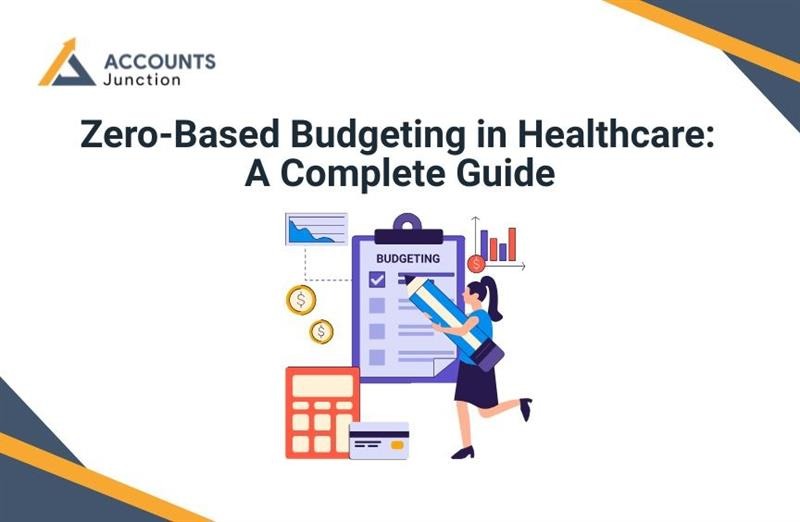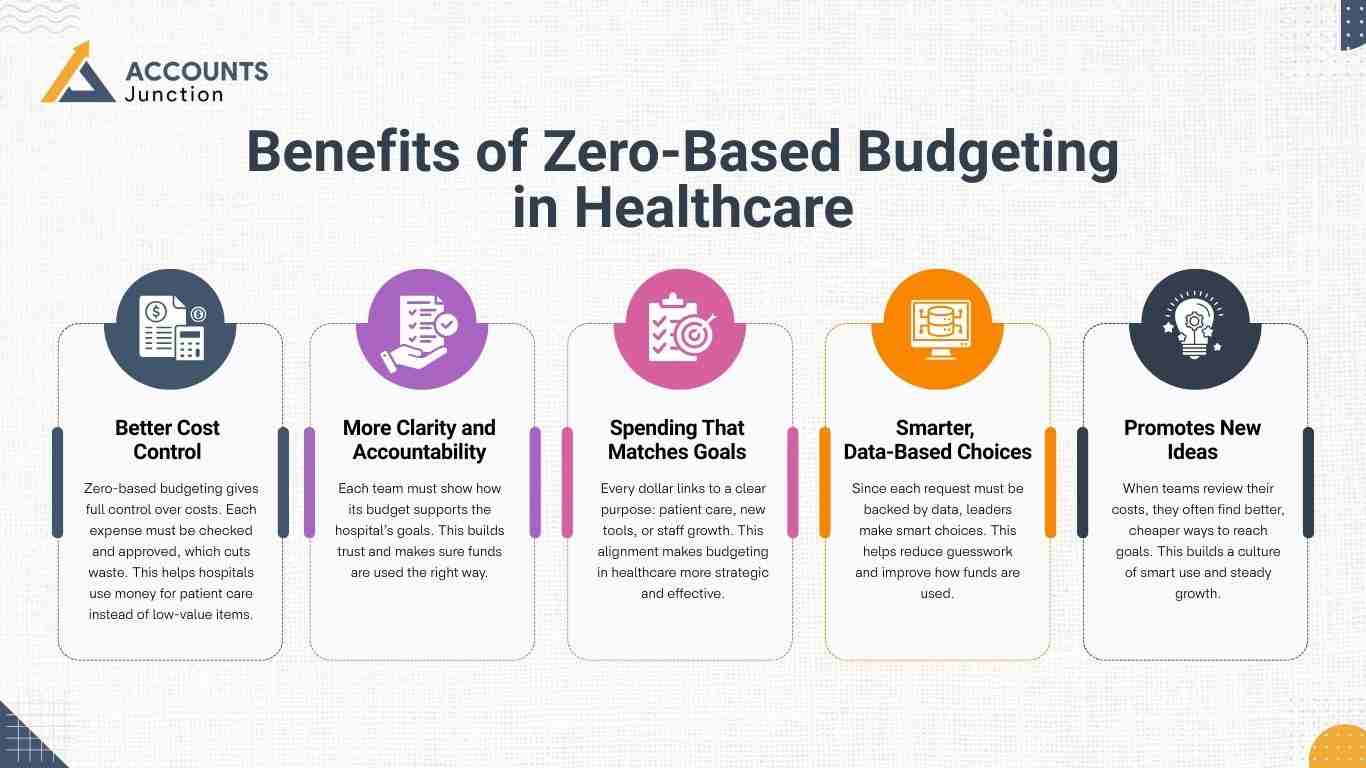
Zero-Based Budgeting in Healthcare: A Complete Guide
The healthcare field changes fast, and sound money control is vital for every medical group. Budgeting in healthcare helps hospitals, clinics, and care units plan costs, manage spending, and use funds where they bring the most value. It also gives leaders a clear view of cash flow and helps improve resource use. One proven way to build strong control is through zero-based budgeting. Unlike old budget methods that copy and paste data, ZBB starts from zero each time. Each cost is checked, approved, and tied to a clear need. This helps cut waste, guide better spending, and direct funds to key goals.
This guide shows how zero-based budgeting works, why it matters in healthcare, and how it helps both small and large providers plan better and stay in full control of their finances.
What Is Zero-Based Budgeting?
Understanding the Concept
Zero-Based Budgeting means starting from zero for every budget cycle. Each cost must be explained and approved, not just carried over from last year. Instead of saying, “We spent this much before, so let’s add 5%,” each department must prove why it needs every dollar.
Why It Matters in Healthcare
In healthcare, every cost affects patient care and facility performance. Zero-based budgeting helps leaders make sure that every dollar supports a purpose, whether it’s better patient service, improved tools, or more trained staff. It also makes it easier to spot areas where spending doesn’t add value.
The Role of Budgeting in Healthcare
1. Planning and Use of Funds
- A clear budget helps hospitals and clinics plan how to use their money. It guides spending on staff pay, tools, supplies, and care programs. Good planning helps care units reach their short-term and long-term goals with balance.
2. Cost Control and Less Waste
- Budgeting in healthcare helps leaders track how money moves through the system. By checking costs often, leaders can spot waste and fix it fast. This helps move funds from low-value tasks to areas that improve care.
3. Tracking Results
- A budget helps check how each team or unit performs. By comparing plans to real results, leaders can see which groups use funds well and which need changes. This supports better, faster choices.
4. Meeting Rules and Building Trust
- Hospitals must follow clear rules for spending and reports. A set budget makes sure all funds are used within those limits.
5. Better Choices for Growth
- Budgets give leaders the facts they need to plan growth. With clear data, they can choose when to hire more staff, buy new tools, or start new care units without risking loss.
6. Staying Ready for Risks
- Health systems face sudden costs such as price hikes or new rules. A good budget acts as a shield, helping the group stay steady and handle such changes with ease.
How Zero-Based Budgeting Works
1: Start from Zero
- Each new cycle of budgeting in healthcare starts from zero. No team keeps old funds by default. Every group must explain what it needs and how each cost supports care or key goals.
2: Justify Every Cost
- Each expense must have a clear reason. For example, a clinic may show why it needs new lab tools or how staff training improves care. This cuts waste and keeps spending focused on real needs.
3: Rank Costs by Value
- Once all costs are listed, leaders rank them by value and effect. Core areas like patient care and safety come first, while low-value costs are reduced or cut.
4: Review and Approve
- Finance teams check each request and choose what to fund. This keeps the plan fair and based on results, not old habits or past figures.
5: Track and Adjust
- After approval, teams track how money is used and compare it to goals. Changes can be made when needed to stay within budget and improve results.
Benefits of Zero-Based Budgeting in Healthcare
1. Better Cost Control
Zero-based budgeting gives full control over costs. Each expense must be checked and approved, which cuts waste. This helps hospitals use money for patient care instead of low-value items.
2. More Clarity and Accountability
Each team must show how its budget supports the hospital’s goals. This builds trust and makes sure funds are used the right way.
3. Spending That Matches Goals
Every dollar links to a clear purpose: patient care, new tools, or staff growth. This alignment makes budgeting in healthcare more strategic and effective.
4. Smarter, Data-Based Choices
Since each request must be backed by data, leaders make smart choices. This helps reduce guesswork and improve how funds are used.
5. Promotes New Ideas
When teams review their costs, they often find better, cheaper ways to reach goals. This builds a culture of smart use and steady growth.

Challenges of Zero-Based Budgeting in Healthcare
1. Time and Effort
-
Starting a budget from zero takes time and focus. Staff must collect data, note each cost, and check results. Once the setup is done, the task gets faster and simpler each year.
2. Staff Training
-
Many team members may not know how to plan a zero-based budget. Simple training helps them learn and keeps the process smooth and clear.
3. Data and System Needs
-
Zero-based budgeting needs clean and correct data. Hospitals need tools to track and report each cost with care and detail.
4. Resistance to Change
-
Some staff may like the old way of budgeting. Clear talks and strong support from leaders help teams trust and use the new system.
How to Implement Zero-Based Budgeting in Healthcare
1: Build a Team
- Create a team that includes finance staff, key managers, and unit heads. This group will plan, check, and approve all budget items to ensure clear control and shared input.
2: Define Clear Goals
- Set simple, focused goals such as improving patient care, reducing waste, or buying new tools. Each department should connect its requests to these main goals.
3: Collect and Study Data
- Gather data from past reports to see where money went and what results it gave. This helps guide new plans and keeps choices based on facts.
4: Review Every Cost
- Each team must explain why a cost matters. Remove or reduce costs that do not bring value or support top goals. This keeps the plan lean and effective.
5: Approve and Track Progress
- After approval, track spending each month or quarter. Adjust the plan if needed to stay within goals and control. This step keeps the process active and results clear.
Zero-Based Budgeting vs. Traditional Budgeting in Healthcare
|
Aspect |
Zero-Based Budgeting |
Traditional Budgeting |
|
Starting Point |
Starts from zero each time |
Based on past budgets |
|
Focus |
Justifies every cost |
Adjusts old numbers |
|
Goal Alignment |
Links spending to current goals |
May keep outdated costs |
|
Flexibility |
Adapts to changes faster |
Slower to adjust |
|
Transparency |
High, as all costs are reviewed |
Lower, with assumed costs |
Zero-based budgeting offers more control and insight, making it ideal for modern budgeting in healthcare.
Real-Life Example of Zero-Based Budgeting in Healthcare
Case: A Mid-Sized Hospital
A mid-sized hospital industry adopted zero-based budgeting to handle rising costs. Each department reviewed its expenses and removed low-value activities. For instance, the hospital found it was overpaying for supplies that weren’t fully used. By reviewing from zero, they cut costs by 15% without reducing patient care.
Results
- Better cash flow
- More funds for staff training
- Improved tracking of supplies
- Stronger decision-making based on data
This shows how zero-based budgeting can transform budgeting in healthcare from a routine task into a growth strategy.
Best Practices for Zero-Based Budgeting in Healthcare
1. Build Team Involvement
- Bring all key teams into the budgeting process from the start. Involving finance, clinical, and admin units ensures full insight into costs and helps find areas to save or improve.
2. Share Goals and Benefits
- Make sure everyone knows why zero-based budgeting matters and how it helps. Sharing goals and showing real results builds trust and keeps all staff aligned.
3. Keep Data Simple
- Use clear and short reports. Simple summaries help leaders and staff see where money goes without confusion.
4. Review Often
- Check the budget monthly or quarterly. Regular reviews help spot errors early and keep spending under control.
5. Link to Performance
- Match spending with key outcomes like patient care, staff growth, or service quality. This ensures every cost adds real value.
6. Use the Right Tools
- Adopt trusted financial software that fits healthcare needs. Tools with real-time tracking and reports make the process smooth and accurate.
7. Support Continuous Training
- Keep teams trained on new methods and tools. Skilled staff make better choices and maintain strong financial control.
Zero-based budgeting in healthcare gives you clear control of costs, helping you fund the right needs and cut waste. It builds a smart plan where every dollar works toward better care and stable growth.
At Accounts Junction, we help healthcare firms put zero-based budgeting into action with expert cost tracking, budget planning, and financial reporting. Our team turns complex numbers into clear plans, so you can run a stronger, more efficient healthcare practice.
FAQs
1. What is zero-based budgeting in healthcare?
- It means starting each budget from zero and explaining every cost before approval.
2. Why use ZBB in healthcare?
- It helps control costs, cut waste, and use funds for what matters most.
3. How is zero-based budgeting different from normal budgeting?
- Normal budgets use last year’s numbers; zero-based starts fresh each time.
4. What is the goal of budgeting in healthcare?
- To plan money use, manage costs, and give better care to patients.
5. Who should join the budgeting process?
- Leaders, finance teams, and key staff from each unit should take part.
6. How often should budgets be checked?
- Check budgets each month or quarter to keep spending on track.
7. What are the steps in zero-based budgeting?
- Start at zero, explain costs, set needs by rank, approve, and review.
8. What reports help with budgeting in healthcare?
- Use a Balance Sheet, Income Report, and Cash Flow Report.
9. What tools help manage healthcare budgets?
- Use simple tools like Excel, QuickBooks, or budget software.
10. Can zero-based budgeting save money?
- Yes, it removes waste and keeps funds for key services.
11. What are the hard parts of zero-based budgeting?
- It takes time, teamwork, and clean, clear data.
12. How can teams learn zero-based budgeting?
- With short training, simple guides, and practice on real data.
13. How does it help patient care?
- It moves money to tools and staff that improve care.
14. Is it good for small clinics?
- Yes, it helps small clinics plan smart and grow well.
15. How can hospitals make it simple?
- Use clear tools, talk often, and keep all records neat.
16. Why is data key in budgeting?
- Data shows where money goes and helps with smart plans.
17. Can it help long-term plans?
- Yes, it keeps spending steadily and plans strongly over time.
18. Why is healthcare budgeting so vital today?
- It keeps care steady, staff ready, and funds used right.
